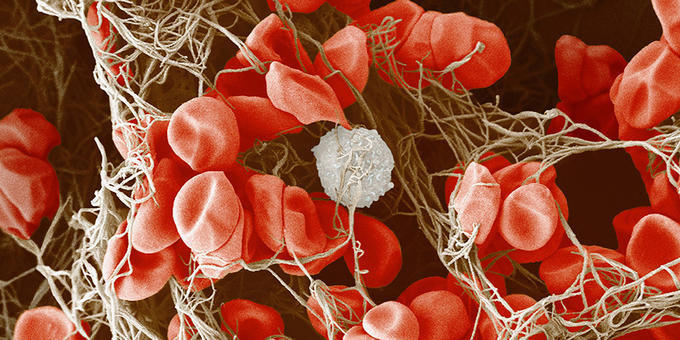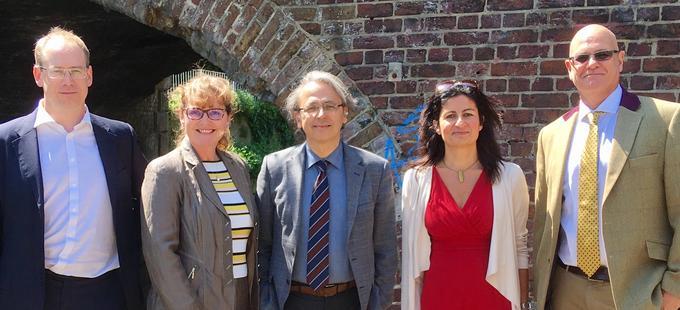Accelerator Award: Portfolio of funded projects and outputs
The Accelerator Award enables exciting translational research by funding cross-institutional teams to produce tools, platforms and resources which will change the research landscape.
We've funded 21 teams since introducing the Award in 2015, and the first funded resources are now available to the research community and transforming translational cancer research.
21
awards funded to date
~£87m
invested across 4 funding rounds
3
leading cancer charities working in partnership
Case studies
Bringing liquid biopsies into the clinic for prostate cancer

Professor Francesca Demichelis has assembled a team to develop the sensitivity of liquid biopsies as a clinical tool for prostate cancer management.
Detecting blood cancers earlier than ever before

Professor Jesus San Miguel is leading an international, multidisciplinary team which is creating new models and datasets which will accelerate research into the early detection of blood cancers.
Unlocking immunotherapies for patients with liver cancer

Professor Helen Reeves has assembled a multidisciplinary team from across Europe to advance research for one of the hardest-to-treat cancers affecting people today.
Full portfolio
Catalysing progress in cancer immunotherapy
Led by: Prof Henning Walczak
Lead centre: UCL
Year awarded: 2015
Value: £5 million
Vision: To establish a state-of-the-art immune-monitoring and discovery hub to maximise the potential of immunotherapeutics to cure more cancers sooner. By building both a discovery and a translational research team, the consortium will work together to create new immunotherapies and validate potential therapeutic targets and treatment combinations.
A national digital pathology and image analysis platform for solid tumours
Led by: Prof Manuel Salto-Tellez
Lead centre: Belfast
Year awarded: 2015
Value: £4 million
Vision: To develop a powerful, open access, software platform to improve the speed and reducibility of digital pathology analysis and enhance the discovery of diagnostic and therapeutic biomarkers in solid cancer. By establishing a molecular digital pathology (MDP) network, the team will build resource and manpower to drive the adoption of MDP in cancer research, to improve precision oncology. They will also invest in the next generation of molecular pathologists by developing a Masters in Molecular Pathology course.
Accelerating drug discovery through a networked structural biology resource
Led by: Profs Mark Carr and Richard Bayliss
Lead centre: Leicester
Year awarded: 2015
Value: £1.8 million
Vision: To accelerate the identification of pertinent therapeutic targets and corresponding treatments in the fight against cancer. By bringing together a expertise in drug development, the team will establish a virtual structural biology resource, including improving access to specialist equipment and expertise, and sharing best practice, to improve target validation.
The Crick, Cancer and the Clinic
Led by: Prof Richard Treisman
Lead centre: The Francis Crick Institute
Year awarded: 2015
Value: £4.2 million
Vision: To harness the excellent research environment at the Francis Crick to Develop a unique clinical research fellow training programme and to deliver support to researchers working on molecular archeology, cancer immunotherapy, and targets for ovarian cancer therapies.
Enabling research into the tumour and the host
Led by: Prof Charles Swanton
Lead centre: UCL
Year awarded: 2016
Value: £4 million
Vision: To develop a unique resource of well-annotated post-mortem tissue to enable research into cancer evolution, intratumour heterogeneity and mechanisms of drug resistance. By collecting longitudinal biological samples from patients with hard to treat cancers across the UK, including after their death, researchers will uncover new insights into the evolution of the tumour and the host, which is essential for the development of precision medicine.
Accelerating the clinical translation of new advanced radiotherapy technologies
Led by: Prof Kevin Harrington
Lead centre: ICR
Year awarded: 2016
Value: £4.3 million
Vision: To optimise and harmonise the use of of new advanced radiotherapy technologies as they transition to the clinic, to improve patient access to state-of-the-art radiotherapy. By working as a network, the team will establish a national cooperative around these new technologies (SABR, MR-Linac and Proton Beam) and create a digital platform to enable adaptive treatment planning and protocol development. The team will also support a training programme to invest in the next generation of radiation oncologists.
Accelerating functional studies in brain tumour research
Led by: Dr Steve Pollard
Lead centre: Edinburgh
Year awarded: 2016
Value: £3.7 million
Vision: To generate a new collection of tools to explore human glioma and underpin a new era of functional studies in brain cancer. The international glioma cellular genetics resource (GCGR) combines high quality primary cellular glioblastoma models and normal stem cells controls, with a state-of-the-art genome editing facility, to develop an open source database for the glioma community. They will also support a training programme that will be co-supervised by developmental neurobiologists at the Francis Crick Institute
Improving immunotherapy treatment for cancer patients
Led by: Prof Tim Elliot
Lead centre: Southampton
Year awarded: 2016
Value: £3.9 million
Vision: To combine cutting-edge immunotherapeutic research expertise to determine how tumours are recognised by the immune system and enhance how these therapies are used to treat patients. The team will decipher the molecular architecture of immune responses in the tumour and translate this to clinical practise for lung, melanoma and oesophageal cancer. By helping to reveal both the mechanistic data and the consequence of this, the team can refine clinical interventions in trials more rapidly across the country.
HUNTER: Hepatocellular Carcinoma Expediter Network
Led by: Profs Helen Reeves and Derek Mann
Lead centre: Newcastle
Year awarded: 2018
Value: £5 million
Funded by: CRUK, AIRC, AECC
Vision: To develop tools to enable the research community to answer specic questions centred on stratication, monitoring and improvement of immunotherapy for hepatocellular carcinoma (HCC). They are collecting tissue and data; characterising the immunogenomic HCC microenvironment; developing preclinical animal and human models; and delivering a PhD training programme.
Multi-modal clinical testing of prostate cancer patient plasma
Led by: Dr Francesca Demichelis
Lead centre: University of Trento
Year awarded: 2018
Value: £5 million
Funded by: CRUK, AIRC
Vision: To develop a liquid biopsy for prostate cancer. The test will use integrated genomic, epigenomic and RNA data to understand tumour evolution and treatment resistance. It will provide a vital tool for doctors and researchers in facilitating patient stratification in future clinical trials
Early detection and intervention of incurable blood cancers
Led by: Prof Jesus San Miguel
Lead centre: Universidad de Navarra
Year awarded: 2018
Value: £4.8 million
Funded by: CRUK, AIRC, AECC
Vision: To bring together expertise in haematological disorders from three hubs in the UK, Italy and Spain. They are developing integrative models in which tumour clonal evolution, microenvironment and immuno-editing will be simultaneously investigated, to explore the mechanisms of cancer progression at different disease stages. The data, delivered through novel bioinformatic tools, could facilitate a paradigm shift in the way blood cancers are treated.
ACRCelerate: Colorectal Cancer Stratified Medicine Network
Led by: Prof Owen Sansom
Lead centre: Glasgow
Year awarded: 2018
Value: £5 million
Funded by: CRUK, AIRC, AECC
Vision: To bring together a European-wide consortium at the forefront of colorectal cancer research to align and interrogate a suite of state-of-the art preclinical models. The team will aim to generate robust and reproducible preclinical data to de-risk future clinical trials based on patient stratification.
Single-cell cancer evolution in the clinic
Led by: Dr Giovanni Tonon
Lead centre: Fondazione Centre San Raffaele
Year awarded: 2018
Value: £4.8 million
Funded by: CRUK, AIRC
Vision: To deliver tools and devices that could be promptly implemented in a clinical setting, to pre-emptively intercept treatment resistance in individual cancer patients. The team will combine cancer evolution modelling, new single-cell approaches and novel microfluidic devices, as well as new data integration techniques, with the aim of providing a definitive single-cell portrait of tumor cells, before and after treatment.
INCAR: Innovative CAR Therapy Platforms
Led by: Prof Andrea Biondi
Lead centre: Universita degli Studi di Milano-Biocca
Year awarded: 2018
Value: £4.5 million
Funded by: CRUK, AIRC, AECC
Vision: INCAR brings together world-class centres across Italy, UK and Spain to improve patient outcomes and broaden the applicability of T-cell therapies by dissecting biological factors influencing CAR T-cell mechanisms of action. By taking advantage of differences in cellular platforms, CAR design, manufacturing and gene transfer methods across the consortium, the team will dissect key biological factors which influence the mechanism of action of CAR-engineered cellular therapies.
NCITA: National Cancer Imaging Translational Accelerator
Led by: Professor Shonit Punwani
Lead centre: UCL
Year awarded: 2018
Funded by: CRUK
Vision: To accelerate the development of standardised imaging techniques through harmonised image acquisition, processing and analysis tools. NCITA brings together 9 leading institutions in the field of cancer imaging to enable the evaluation and qualification of a pipeline of novel imaging biomarkers through multicentre clinical trials. The award supports 3 complementary cross-institution units: the NCITA Trials Unit, NCITA QA/QC Unit and the NCITA Image Repository Unit. The vision is that these will work in synergy to establish a certified development pipeline for quantitative cancer imaging biomarkers, from concept to clinic.
Smart experimental trials enabled
Led by: Professor Caroline Dive
Lead centre: Manchester
Year awarded: 2019
Value: £4.4m
Funded by: CRUK, AIRC, AECC
Vision:
1.Scientific: Through the digitisation of experimental cancer medicine trials, the translatability of pre-clinical observations to clinical trials will increase by reducing false-negatives arising from insensitive experimental methodology
2. Capability/Infrastructure: To remain a competitive experimental medicine network in Europe to sponsors whose key driver in Phase 1 is to have near-real time access to data from patients recruited and to hypothesis generate and test from the emerging clinical trial dataset
PREDICT-Meso: PRE-malignant Drivers Combined with Target-Drug validation in Mesothelioma
Led by: Professor Kevin Blyth
Lead centre: Glasgow
Year awarded: 2019
Value: £5m
Funded by: CRUK, AIRC, AECC
Vision: PREDICT-Meso will establish an international network of researchers in the UK, Spain & Italy, focused on creating longitudinal human cohorts transitioning from a pre-malignant inflammatory phenotype to MPM, aligned with state-of-the-art pre-clinical work-flows dedicated to target identification, in vitro & in vivo models, drug-screening, target-drug validation, multiomic risk-profiling and response tool validation.
Early Cancer Reseach Initiative Network on MBL and MGUS models (ECRIN- M3)
Led by: Professor Alberto Orfao
Lead centre: Centro de Investigación del Cáncer de Salamanca (CIC)
Year awarded: 2019
Value: £4.8m
Funded by: CRUK, AIRC, AECC
Vision: The ultimate goal of the proposal is to accelerate research and foster the development, transfer and adoption of novel preventive measures, early diagnosis and monitoring procedures, and to anticipate potential beneficial therapeutic interventions for MBL-CLL and MGUS-MM subjects-patients, as a model also for other hematological and non-hematological cancers.
Accelerating our ability to understand and target complexity and heterogeneity in cancer through automated imaging of 3D cancer
Led by: Professor Paul French
Lead centre: Imperial
Year awarded: 2019
Value: £4.5m
Funded by: CRUK, AECC
Vision: We aim to explore the trade-off between complexity of 3D cancer models and power of assays (in terms of single cell resolution and throughput) by developing modular open source automated instrumentation optimised for 3D imaging of complex cell cultures with a range of optical properties. We will also explore cell culture and sample preparation (e.g. labelling, mounting, clearing) techniques to enable researchers to optimise 3D assays to address their specific cancer biology questions.
Pseudomyxoma peritonei: building a European multicentric cohort to accelerate new therapeutic perspectives
Led by: Professor Marcello Deraco
Lead centre: Fondazione IRCCS - Istituto Nazionale dei Tumori - Milano
Year awarded: 2019
Value: £2.5m
Funded by: CRUK, AIRC, AECC
Vision: Pseudomyxoma Peritonei (PMP) is a poorly understood, rare malignancy originating from mucinous appendiceal tumors, affecting an estimated 1-2/1.000.000/year. PMP is characterized by gross accumulation of mucinous tumor in the abdominal cavity and has a non-metastatic growth pattern. Peritoneal dissemination and progressive accumulation of mucinous tumor, if untreated, are ultimately fatal. Complete cytoreductive surgery and hypertermic intraperitoneal chemotherapy (CRS-HIPEC) is considered the standard of care as it confers an overall survival benefit of up to 63% at 10 years. Currently, there are no other medical treatments that demonstrate a significant benefit in PMP therapy. We will establish a multicenter cohort of PMPs surgically treated in five institutions highly specialized in peritoneal surface malignancies (PSM), based in UK, Italy and Spain. We will construct a research infrastructure deeply committed to study the pathophysiology of PMP progression.
Improving neoadjuvant therapy in high-risk sarcoma
Led by: Professor Robin Jones
Lead centre: ICR
Year awarded: 2019
Value: £2.5m
Funded by: CRUK, AIRC, AECC
Vision: The vision is to deliver datasets, data mining tools and patient-derived models that will drive the development of a stratified medicine approach for personalised NCT in high-risk STS patients. This will be achieved through 3 interrelated programs.1)Develop a common data platform to enable standardised clinicopathological and imaging data collection and curation of STS clinical specimens. 2)Generate molecular datasets and models that shed light on the biological processes impacting tumour response to NCT and 3)Develop a suite of data mining tools to facilitate analysis and integration of clinical and molecular data for use by the sarcoma community.
Local Immunotherapy (LIRT)
Led by: Professor Ignacio Melero
Lead centre: Universidad de Navarra
Year awarded: 2019
Value: £3.8m
Funded by: CRUK, AIRC, AECC
Vision: Synergistic combinations of radiotherapy and immunotherapy have been reported preclinically and hinted in case reports and early clinical trials. This project aims to test intratumour injection of immunotherapy agents and external radiotherapy to assess efficacy and mechanisms of action. The main objective is to comparatively identify the most powerful treatment strategy, addressing the immune mechanisms of action underlying efficacy and resitance. Three clinical trials are proposed encompassing radiotherapy (SABRT or Proton beam) in conjunction with intratumoral injection of pathogen-denoting molecular patterns already undergoing clinical development of intralesional delivery as immunotherapy agents.
Contact us
CRUK office
Brooke Lumicisi
Tel: 0203 469 5155
AIRC office
Luana Grimolizzi
AECC office
Marta Puyol
